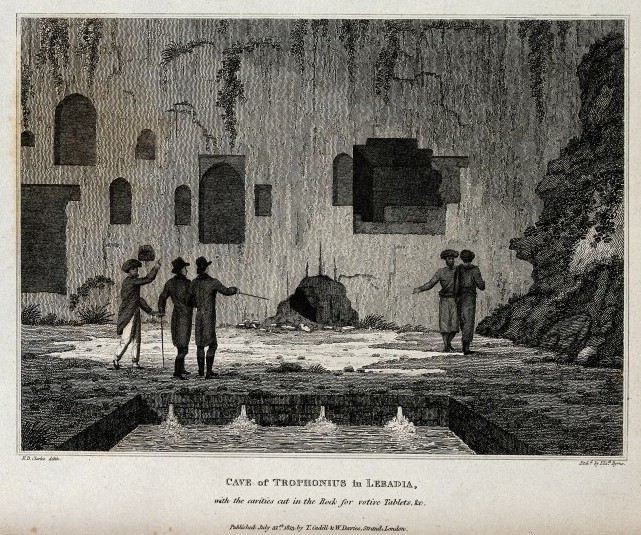n ancient Greece, oracles held sway over important life decisions. People visited the shrines to receive counsel on everything from difficult religious questions and the healing of ailments, to determining if they should wage war on a neighboring empire.
Moreover, there were plenty of oracles to choose from and many ways to receive insight. You could unravel the riddles of the ever-popular oracle of Apollo at Delphi, hear the murmurs of Zeus at Dodona, or whisper in Hermes’ ear at the marketplace in Pherae. Or, if you’re Croesus, king of Lydia, you might just send proxies to every single oracle known to humankind…
But, if you’re stout of heart and very adventurous, you might want to pay a visit to the oracle of Trophonius and the cave of nightmares.
Hero, Thief, or Divine?

When looking through the annals of history and legend, you’ll find that some refer to Trophonius – the owner of said oracle – as a god, while many say he is a hero, and still others name him a thief.
So which was he? God, hero or thief?
Well, overall, there are two main traditions about Trophonius.
In the first version, found in Consolatio ad Apollonium, Plutarch summarizes the great poet Pindar’s take on the fellow.
It goes something like this: Trophonius and his brother, Agamedes, were talented architects and builders, and their work was of such renown that Apollo had them design and build his temple at Delphi. After completing their work, Trophonius and his brother asked Apollo for a reward. The god of sun and light instructed them to live freely for seven days, and only afterwards, would they receive their reward.
They followed his instructions, and on the seventh night . . . they died.
So, what’s going on here? Apollo rewarded them with death? The main thing to note is that Apollo didn’t just give them death; he gave them a peaceful death. According to Plutarch, this really wasn’t so strange—the gods often rewarded the pious with a calm departure to the afterworld.
Indeed, Plutarch believed that the end of life was a good thing:
“If death indeed resembles a journey, even so it is not an evil. On the contrary, it may even be a good. For to pass one’s time unenslaved by the flesh and its emotions, by which the mind is distracted and tainted with human folly, would be a blessed piece of good fortune.”
But was Trophonius really that pious of a guy?
Pausanias gives us the other major narrative of Trophonius in his Description of Greece.
Same as in Pindar/Plutarch’s account, Trophonius and his brother Agamedes were talented architects and builders. But, after completing their work at Delphi, they weren’t rewarded with death…
Instead, they did one final job: they built a treasure house for King Hyrieus of Boeotia. As usual, they did a great job, but this time they did something different… they added a secret entrance and proceeded to quietly rob King Hyrieus.
Baffled by the slowly diminishing gold and silver, Hyrieus set a trap, and consequently, the next time the brothers snuck into the treasury, Agamedes got caught.
But then things got a little weird. Trophonius beheaded his brother and was suddenly swallowed up by the earth.
Regardless of which narrative you favor, one thing we know for sure is that Lebadeia dedicated a cult and an oracle to Trophonius. But… in order to consult Trophonius, one needed to enter a chasm deep in the earth—the cave of nightmares.
The Descent
According to Pausanias, visiting the cave of Trophonius was no easy task.
Interested in consulting Trophonius? First, one needed to live in a shrine for “an appointed number of days.” During this time, they had to bathe in the river Hercyna, abstain from hot baths, and make animal sacrifices to a motley group of gods. After each sacrifice, a diviner studied the animal’s entrails in order to determine whether or not Trophonius will receive the interested oracle seeker graciously.
Then the descent begins. To begin with, one needed to drink the waters of Forgetfulness to make their mind a blank slate. Then, they had drink the waters of Memory to ensure that they will retain everything they see and hear in the cave.
While descending into the cave, the hearty adventurer had to be sure that they had honey cakes with them. Apparently, honey cakes are the only way to appease the many serpents you will encounter along the way.
But, once in the chasm, they can sit back, relax, and enjoy nightmarish visions and hear terrifying voices for an undetermined amount of time.
Eventually, they will leave the cave and recount their findings.
Here’s Pausanias’ description of what happens next:
“After his ascent from Trophonius the inquirer is again taken in hand by the priests, who set him upon a chair called the chair of Memory, which stands not far from the shrine, and they ask of him, when seated there, all he has seen or learned. After gaining this information they then entrust him to his relatives. These lift him, paralyzed with terror and unconscious both of himself and of his surroundings, and carry him to the building where he lodged before with Good Fortune and the Good Spirit. Afterwards, however, he will recover all his faculties, and the power to laugh will return to him.”
As horrific as the experience sounds, Pausanias says only one person died while at the oracle of Trophonius: a man who was trying to steal gold and silver from the shrine.
Searching for Answers

Looking through the ancient texts, it appears that people visited the oracle of Trophonius for a myriad of reasons.
For example, in Herodotus’ The Histories, King Croesus dispatches a man to consult with Trophonius (along with nearly every other oracle) before waging war against the Persians. In Livy’s Ab Urbe Condita, Consul Lucius Aemilius Paulus visits the shrine of Trophonius to check out the entrance to the cave (but does not enter it). Plutarch’s Amatoriae Narrationes also mentions a father who wishes to receive the oracle’s guidance about which of two suitors his daughter should marry (this ends up not happening and, as you can probably guess, everyone dies instead).
One of the more colorful stories about the oracle of Trophonius comes from Flavius Philostratus’ fanciful biography of the Neopythagorean philosopher, Apollonius of Tyana.
Apollonius visited the oracle of Trophonius in order to consult the god/hero/thief. At first, the priests turned him away, believing that he is a magician, but eventually, he gained access to the cave.
Seven days later, Apollonius emerged, claiming to have found a volume containing the tenets of Pythagoras. He also stated that he received the volume in response to asking Trophonius what he considered “the most complete and purest philosophy.”
Apparently our friend Trophonius wasn’t just an expert architect, builder, and accused thief—he was a certified Pythagoras fanboy.
Worth the Trip
While a fascinating story, the oracle of Trophonius does offer a window into the role of heroes, deities, and decision-making in the ancient world.
By visiting oracles, people received what they believed to be divine sanction or discouragement for their plans. But… at the same time they revealed people’s true desires. Essentially, because most oracles did not provide straightforward answers, consulting them let individuals and communities reflect on their perspectives and intentions and interpret the response as they wished.
This guidance and experience was valuable—so valuable that it was apparently worth a trip to the cave of nightmares.
Δεν υπάρχουν σχόλια:
Δημοσίευση σχολίου